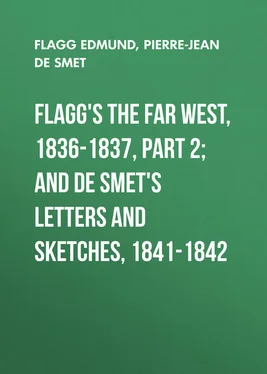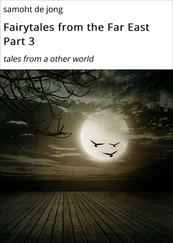Edmund Flagg - Flagg's The Far West, 1836-1837, part 2; and De Smet's Letters and Sketches, 1841-1842
Здесь есть возможность читать онлайн «Edmund Flagg - Flagg's The Far West, 1836-1837, part 2; and De Smet's Letters and Sketches, 1841-1842» — ознакомительный отрывок электронной книги совершенно бесплатно, а после прочтения отрывка купить полную версию. В некоторых случаях можно слушать аудио, скачать через торрент в формате fb2 и присутствует краткое содержание. Издательство: Иностранный паблик, Жанр: foreign_antique, foreign_prose, на английском языке. Описание произведения, (предисловие) а так же отзывы посетителей доступны на портале библиотеки ЛибКат.
- Название:Flagg's The Far West, 1836-1837, part 2; and De Smet's Letters and Sketches, 1841-1842
- Автор:
- Издательство:Иностранный паблик
- Жанр:
- Год:неизвестен
- ISBN:нет данных
- Рейтинг книги:4 / 5. Голосов: 1
-
Избранное:Добавить в избранное
- Отзывы:
-
Ваша оценка:
- 80
- 1
- 2
- 3
- 4
- 5
Flagg's The Far West, 1836-1837, part 2; and De Smet's Letters and Sketches, 1841-1842: краткое содержание, описание и аннотация
Предлагаем к чтению аннотацию, описание, краткое содержание или предисловие (зависит от того, что написал сам автор книги «Flagg's The Far West, 1836-1837, part 2; and De Smet's Letters and Sketches, 1841-1842»). Если вы не нашли необходимую информацию о книге — напишите в комментариях, мы постараемся отыскать её.
Flagg's The Far West, 1836-1837, part 2; and De Smet's Letters and Sketches, 1841-1842 — читать онлайн ознакомительный отрывок
Ниже представлен текст книги, разбитый по страницам. Система сохранения места последней прочитанной страницы, позволяет с удобством читать онлайн бесплатно книгу «Flagg's The Far West, 1836-1837, part 2; and De Smet's Letters and Sketches, 1841-1842», без необходимости каждый раз заново искать на чём Вы остановились. Поставьте закладку, и сможете в любой момент перейти на страницу, на которой закончили чтение.
Интервал:
Закладка:
At Prairie du Rocher, as everywhere else where these ancient villages remain as yet undisturbed in their century slumbers, the peculiarities to which I have so frequently alluded stand forth to the traveller's eye. The narrow lanes, the steep-roofed houses, the picketed enclosures, the piazza, the peculiar dress, manners, and amusements of the villagers, all point back to a former age. At this place I tarried for dinner, and while my olive-browed hostess, a trim, buxom little matron, was "making ready," I strolled forth to the bluffs, having first received most positive injunctions to make my reappearance when the horn sounded ; and, scrambling up a ravine, soon stood upon the smooth round summit. The whole tract of country over which my route had led was spread out like a map before me; and the little village lay so directly at my feet I could almost look down its chimneys. Among the crags I obtained some fine petrifactions, which I exhibited to my simple host, much to his astonishment, on my return. Forty years had this man dwelt upon the very spot he then inhabited, the scene of his birth; and almost every day of his life had he ascended the cliffs among which I had been clambering; and yet, though the seashells were standing out in every direction from the surface of the ledge, not the slightest peculiarity of structure had he ever dreamed of. That the great ocean had rolled among these rocks, he could have formed no conception. Experience had told him that when burned they were lime, and he neither knew nor cared to know anything farther of their character or history. This slight incident well exemplifies the simplicity of this singular people. Content to live where his father lived; content to cultivate the spot he tilled; to tread in the steps which he trod; to speak the language he spake, and revere the faith he observed, the French villager is a stranger to the restless cravings of ambition, and acknowledges no inclination to change. At Prairie du Rocher is a little, dark-looking, ancient Catholic church, dedicated to St. Sulpice, formerly "Chapel of Ease" to Fort Chartres, but at present it has no resident priest. The population of the village is about two hundred. Its site is low, and, buried as it is in such enormous vegetation, the spot must be unhealthy: yet, year after year, and generation after generation, have its present inhabitants continued to dwell where death almost inevitable must have awaited an American. But where will you search for a fleshier, sleeker, swarthier-looking race than these French villagers? Some attribute this phenomenon to diet; some to natural idiosyncrasy; and other some do not attribute at all, but merely stand amazed. The truth of the matter is – and the fact is one well ascertained – that, give a Frenchman a fiddle, a pipe, a glass of claret, and room enough to shake his heels, and, like a mushroom, he'll vegetate on any soil!
La Prairie du Rocher, Ill.
XXXVIII
"I have seen the walls of Balclutha, but they were desolate. The thistle shook there its lonely head: the moss whistled to the wind. The fox looked out from the windows; the rank grass of the wall waved round his head." – Ossian.
"We do love these ancient ruins:
We never tread upon them but we set
Our foot upon some reverend history."
To those of the present day who are in some degree acquainted with the extent of the vast Western Valley, it is not a little surprising to observe how inadequate the conception with which, by its early proprietors, it was regarded, and the singular measures which their mistaken estimates originated. It is but within a very few years that the extent and resources of this country have become sufficiently developed to be at all appreciated. That the French government was wholly unaware of its true character in the cession of old Louisiana to Mr. Jefferson in the early part of the present century, and that our own people were at that time little less ignorant of the same fact, need hardly be suggested to one acquainted with the diplomatic negotiations of the day, or with the views and the feelings of the respective powers then expressed.
But there are few circumstances which more definitely betray the exceedingly inadequate idea entertained by France respecting her possessions in North America, than that early article of her policy, of uniting her Canadian colonies, by a continuous chain of military posts, with those upon the Gulf of Mexico. That any ministry should seriously have entertained the idea of a line of fortifications four thousand miles in extent, through a waste, howling wilderness such as this valley then was, and along the banks of streams such as the Ohio and Mississippi yet continue to be; and that the design should not only have been projected, but that measures should actually have been entered upon for its accomplishment, seems, at the present day, almost incredible. And yet, from the very discovery of the country, was this scheme designed, and ever afterward was steadily pursued by the government of France. La Salle, in his last visit to Paris, suggested the policy of a cordon of posts from the St. Lawrence to the Gulf of Mexico, and urged the measure upon Colbert as affording a complete line of defence to the French settlements against those of the English along the Atlantic shore. In furtherance of this design, he sailed to establish a colony at the mouth of the Mississippi, in prosecution of which expedition he lost his life. A line of fortifications was, however, commenced, and gradually extended along the southern shore of Lake Erie: one stood on the present site of the village of that name; another between that point and the Ohio; a third on the present site of Pittsburgh, named Du Quesne; a fourth at the mouth of the Kentucky River; a fifth on the south bank of the Ohio below; a sixth on the northern bank at the mouth of the Wabash; a seventh at the confluence with the Mississippi; half a dozen others on the latter stream below the junction, and several above upon its banks and along those of the Illinois. Among these last, and the most extensive of the fortifications then erected, was Fort Chartres, long the most celebrated military post in North America, now a pile of ruins. 50
It was a beautiful afternoon, when, leaving the little French hamlet La Prairie du Rocher , after a delightful ride of three or four miles through rich groves of the persimmon, the wild apple, and the Chickasaw plum, 51I began to believe myself not far from the ruins of this famous old fort. Accosting a French villager whom I chanced to meet, I inquired the site of the ruins. He turned on me his glittering dark eye for a moment, and, pointing away to the dense belt of forest upon the left in a direct line with an enormous black-locust on the right of the pathway, passed on. Not the slightest indication of the object of my inquiry was to be seen; but deeming it fruitless to attempt gathering farther information from the dark-browed villager, who was now some distance on his way, I turned my horse's head from the path, and, after labouring several rods through the deep, heavy grass of the prairie, entered the wood. The dense undergrowth of bushes and matted vines was undisturbed, and there was not an indication of visiters at the spot for months. All seemed deserted, and silent, and drear. The ruins were completely shrouded in foliage, and gigantic trees were rearing their huge shafts from amid the crumbling heaps of rubbish. Wild grape-vines and other parasites were creeping in all directions over the trembling structures; or, drooping forth in pensile gracefulness from the disjointed walls, seemed striving to bind up the shattered fragments, and to conceal the pitiless ravage of time. The effect of this noble old pile of architecture, reposing thus in ruins, and shrouded in the cathedral duskiness of the forest, was singularly solemn.
Читать дальшеИнтервал:
Закладка:
Похожие книги на «Flagg's The Far West, 1836-1837, part 2; and De Smet's Letters and Sketches, 1841-1842»
Представляем Вашему вниманию похожие книги на «Flagg's The Far West, 1836-1837, part 2; and De Smet's Letters and Sketches, 1841-1842» списком для выбора. Мы отобрали схожую по названию и смыслу литературу в надежде предоставить читателям больше вариантов отыскать новые, интересные, ещё непрочитанные произведения.
Обсуждение, отзывы о книге «Flagg's The Far West, 1836-1837, part 2; and De Smet's Letters and Sketches, 1841-1842» и просто собственные мнения читателей. Оставьте ваши комментарии, напишите, что Вы думаете о произведении, его смысле или главных героях. Укажите что конкретно понравилось, а что нет, и почему Вы так считаете.












